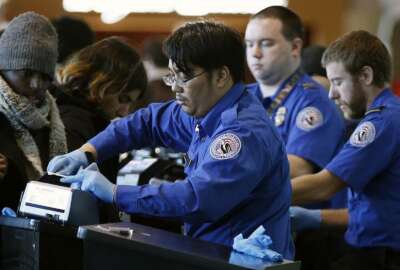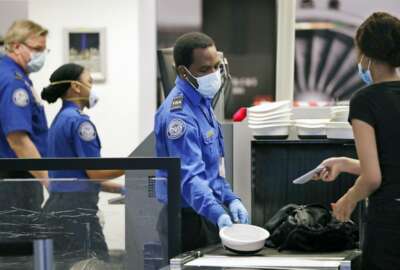
Christmas in July: Omnibus would give TSA employees pay raise next summer
The government funding bill includes $398 million to bring TSA salaries in line with the rest of the federal workforce and the General Schedule system.
Best listening experience is on Chrome, Firefox or Safari. Subscribe to Federal Drive’s daily audio interviews on Apple Podcasts or PodcastOne.
Transportation Security Administration employees are in line for a pay raise next July after lawmakers included funding in the omnibus spending bill to increase salaries and benefits for TSA’s workforce.
The government funding bill includes $398 million to bring TSA salaries in line with the rest of the federal workforce and the General Schedule system. The legislation would give TSA 180 days to brief lawmakers on “a detailed plan to effectively measure the impact of these personnel system changes on TSO recruitment, hiring and retention.”
The Senate passed the spending bill on Thursday, and it now awaits action in the House.
In a Dec. 20 email to TSA employees, TSA Administrator David Pekoske applauded the funding and said the legislation allocates the funds beginning July 1, 2023.
“Congress’ attention to TSA’s pay equity plan demonstrates the critical work you all do to protect the nation’s transportation systems,” he wrote.
Pekoske referred employees to a pay calculator developed by TSA’s Human Capital office to help them estimate salaries under the new pay system. If the legislation is passed and signed into law, he said the increases would be reflected in pay checks on or around July 24.
In a statement, House Homeland Security Committee Chairman Bennie Thompson (D-Miss.) praised the TSA pay equity funding. Thompson is the lead sponsor of the Rights for the TSA Workforce Act, which would put TSA’s workforce under the same personnel system as other federal employees. The bill passed the House in May, but ultimately stalled in the Senate.
“Although we were unable to move TSA’s workforce to the proven title 5 system — as the House and the administration supported — this funding still represents by far the biggest advancement for the workforce in TSA’s history,” Thompson said.
Johnny Jones, secretary-treasurer for the American Federation of Government Employees’ TSA Council 100, said AFGE is “very pleased” to see the pay equity funding in the omnibus.
“We’re hoping that once the funds have been allocated, we’ll fix the pay issues and hopefully address some of the collective bargaining rights issues that we have at the TSA,” Jones said.
TSA officers are generally paid about 30% less than their counterparts at other federal agencies. The agency faces 20% annual staff turnover, and officials point to the agency’s low pay compared to the rest of the federal workforce as the primary issue when it comes to hiring and retaining employees.
Pekoske told a Senate committee in July that achieving pay equity is his top priority over his next five-year term as administrator.
“It’s very, very hard for us to recruit people because they’re looking at the pay system,” Pekoske said. “Even if we can recruit them, they’ll decide to come into TSA sometimes and then transition to another agency.”
Jones, a 20-year TSA veteran stationed at Dallas Fort Worth International Airport, said his annual salary is $50,800. Civilian employees at other agencies under the General Schedule system with the same amount of experience in the Dallas area would expect to make approximately $76,000 annually.
The omnibus also includes $61 million for new transportation security officer hiring. It also includes a new requirement for TSA to start bring Congress every month on officer staffing levels “using the most current payroll data available, combined with commensurate passenger volume and wait-time data.”
“TSA shall ensure that future budget requests and briefings include a detailed forecast of passenger volume in relation to requested TSO staffing levels and specify projected operational efficiencies and passenger experience improvements resulting from the continued investment and deployment of new screening technologies,” lawmakers wrote in the explanatory statement of the bill.
“That’s how far behind my pay is with everybody else in the government,” Jones said.
Thompson’s statement also said the fiscal 2023 funding bill would cover “collective bargaining rights for TSA’s frontline workforce.” The administration’s employees currently have collective bargaining for a limited number of topics.
AFGE has pushed Pekoske to expand collective bargaining immediately, pointing to explicit direction from the White House to do so. But TSA has said it needs additional funding and staff to manage a workforce with full labor rights. TSA requested $120 million in fiscal 2023 to implement collective bargaining.
Jones said AFGE is hopeful Pekoske will sign a determination granting full collective bargaining rights in the near term.
“We haven’t been given any clear indication from the agency,” he said, noting that AFGE and TSA management would likely meet when the spending bill becomes law.
The meetings will also focus on implementation of the pay equity plan. In January, TSA had estimated a GS-equivalent raise would result in an average 30% increase in base pay for transportation security officers and an average 20% increase in base pay for federal air marshals.
“One of the hardest parts of this entire conversion is making sure that the agency follows through in this pay equity program,” Jones said. “We’re going to be obviously pushing the agency to make sure that the pay equity program is rolled out properly. There’s been some discrepancies about how this conversion is going to work. And if it’s not up to the par, then we’re going to be throwing the yellow flag, we’re going to be reaching out to our friends in Congress to make sure that the funding is appropriated properly.”
Copyright © 2025 Federal News Network. All rights reserved. This website is not intended for users located within the European Economic Area.
Follow @jdoubledayWFED
Related Stories




